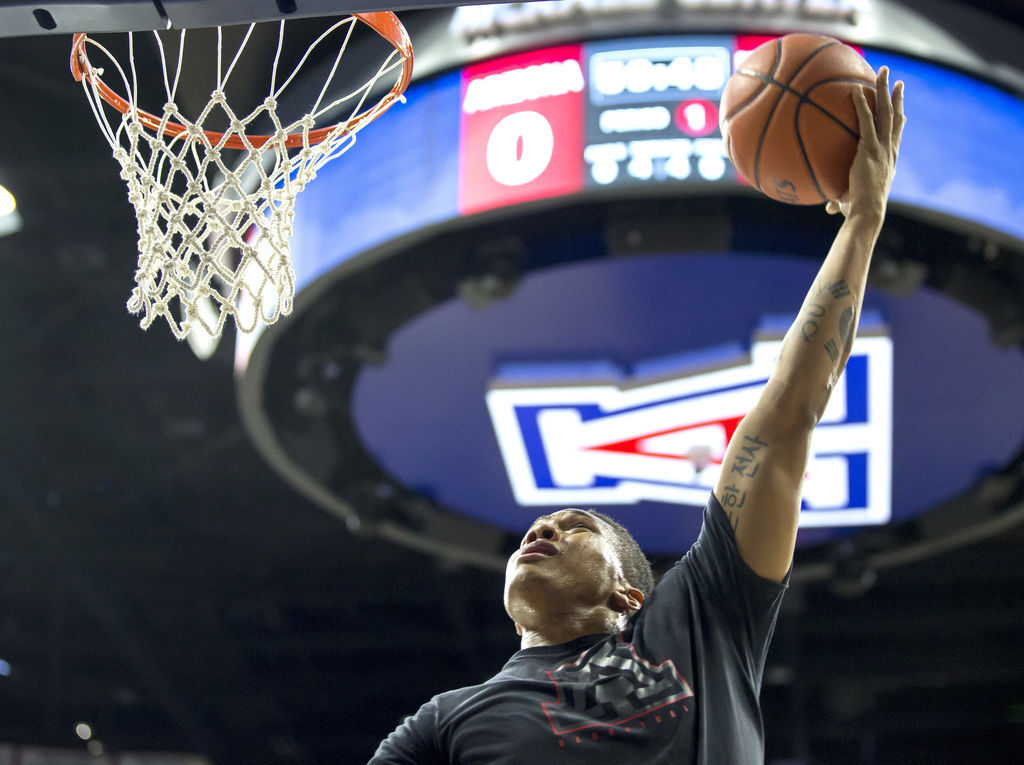The Pac-12 will surround its December football championship game with a week of 12 extra men’s basketball games starting in 2021, filling out new 20-game basketball schedules in a manner that could provide the conference extra exposure.
“When we look forward, it lays out pretty nicely,” said Jamie Zaninovich, who oversees men’s basketball as the Pac-12’s deputy commissioner. “Over a period of five days, we think it will be a really positive coming-out of the conference basketball schedule each year.”
The Pac-12 is scheduled to move from 18 to 20 men’s basketball games for the first time next season but, because of academic calendars and previously scheduled games, is not immediately able to standardize when the extra two games would be played on top of the usual 18-game rotation that typically begins around New Year’s.
As a result, the extra 12 conference games in 2020-21 are being spread from late November to mid-December, with Arizona playing its extra games on Dec. 2 (Colorado at McKale Center) and Dec. 19 (at Stanford).
In future seasons, the Pac-12 will have each team play an 18-game schedule after Christmas in a “travel partner” manner similar to how it does now, plus two extra games between Wednesday and Sunday of the football championship week. One of those games would be away and the other at home for each team.
Each Pac-12 team will now face all but two opponents twice each season. As with an 18-game schedule, a team will always face its geographic rival twice per season, while one two-game road swing and one two-game homestand will be skipped — but with the new 20-game schedule, one of those road games and one of the home games would be added back each season.
Over the course of 10 years, every team would play its geographic rival 20 times and all other teams 18 times. While that still means a marquee matchup such as Arizona-UCLA or Washington-Oregon will be played only once in some years, Zaninovich said the new rotation will ensure no matchup is reduced to just one game for consecutive seasons.
In 2015-16 and 2016-17, Arizona played Oregon only once and in 2017-18 and 2018-19 played UCLA and USC only once. During the Pac-12’s spring meetings in 2018, coaches expressed concern that USC was snubbed from the NCAA Tournament in part because it did not have a chance to host either Arizona or ASU that season.
“The membership wanted to keep it as a rotation but we found a way to limit how often, especially in consecutive years, certain schools have missed others on their second games they play,” Zaninovich said. “I think people will be pleased in terms of that change relative to the model we were in.”
Knowing such a move was coming, Arizona director of basketball operations Ryan Reynolds said the Wildcats have left open most of their early dates in the 2021-22 season.
So far in 2021-22, UA is only scheduled to open with NAU and play in the Las Vegas Invitational over Thanksgiving week. Of other multi-team events, the Wildcats are scheduled to play in the NIT Season Tip-Off next season and the Maui Invitational in 2022-23.
COVID-19 contingency planning in the works
As with football, the Pac-12 has also begun a working group to consider what might happen if basketball schedules and/or protocols are changed, reduced or canceled next season because of the COVID-19 crisis. But with plenty of time before basketball season is scheduled to begin in November, Zaninovich said the talks were just getting organized.
“That’s the work we’ll do,” Zaninovich said. “But there’s some other priorities before that relative to summer recruiting and getting on the same page with return-to-play timelines before we get to the scheduling and operations stuff.”
Real-time officiating reviews coming
One of the major non-COVID basketball topics held at the Pac-12’s virtual meetings last week was the potential ability for coaches to review officials soon after a game instead of only after the season.
The Pac-12 hired an outside consultant with NBA and college officiating oversight experience to study its officiating program, run by coordinator Bobby Dibler. The league was told the program exceeded standards in communication and training, met standards in evaluation and fell below standards in recruiting.
One way it might improve evaluation, Zaninovich said, was by allowing coaches to submit evaluations of officials starting at noon the day after a game (after the standard “cooling off” period in which coaches are not allowed to contact the conference office).
Coaches had expressed a desire to evaluate during instead of just after the season, Zaninovich said, adding app-like technology is being considered to make it easier for them to do so.
Officiating “is a very emotional thing, but Bobby has been a trusted worker in this regard and worked with our coaches very well,” Zaninovich said. “We had a couple of recommendations of how we could do coaches evaluations in a little more efficient way, how we could increase some transparency around the type of training and, (with) documents that we send to our officials, share those more broadly.”
There were a “couple of recommendations on how we coordinate instant replay protocols, and that type of thing but that was really mostly it,” Zaninovich added. “We definitely took back some things we always can do better. But in general, there were not a lot of issues, so we were encouraged by it.”





